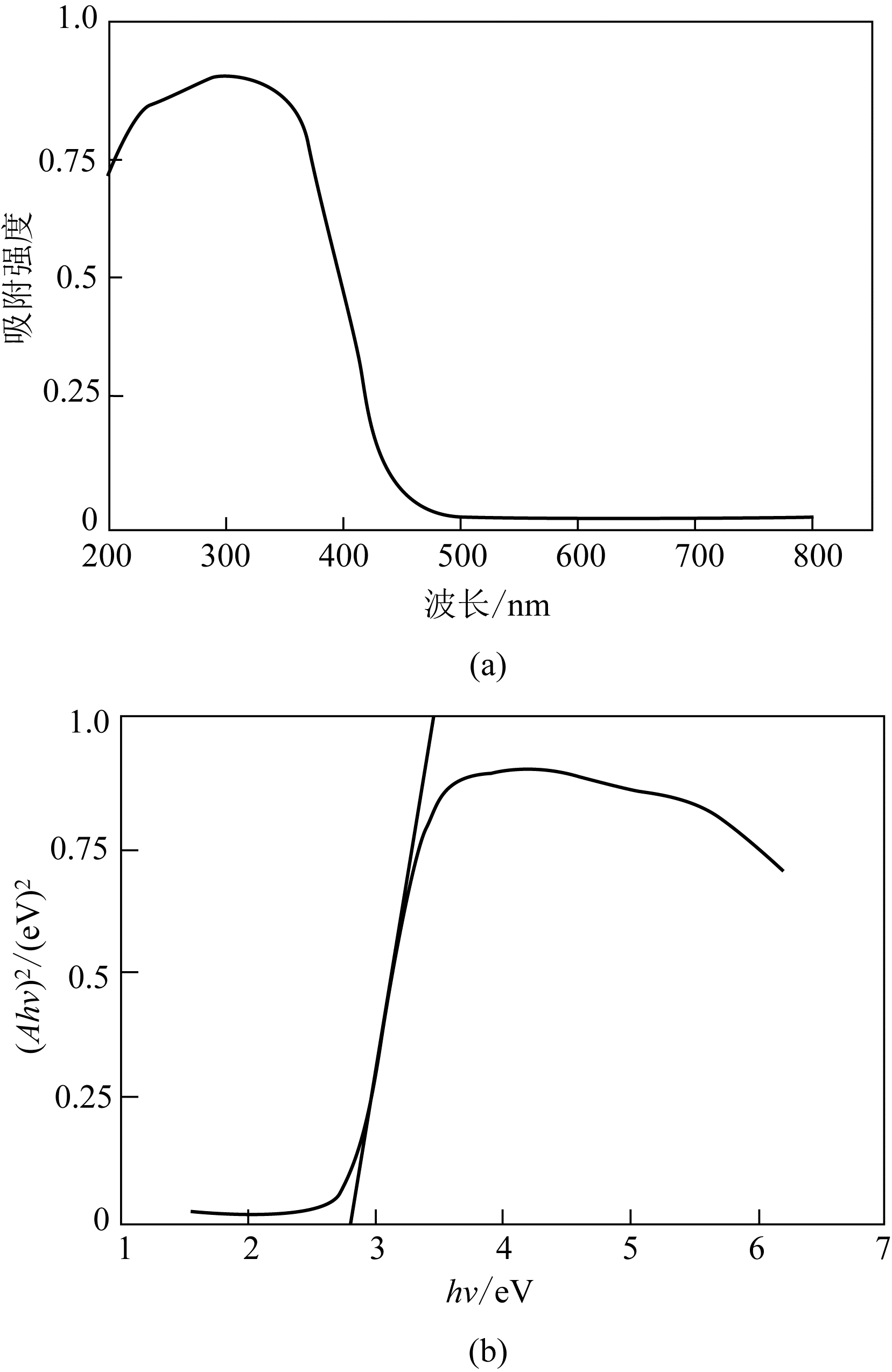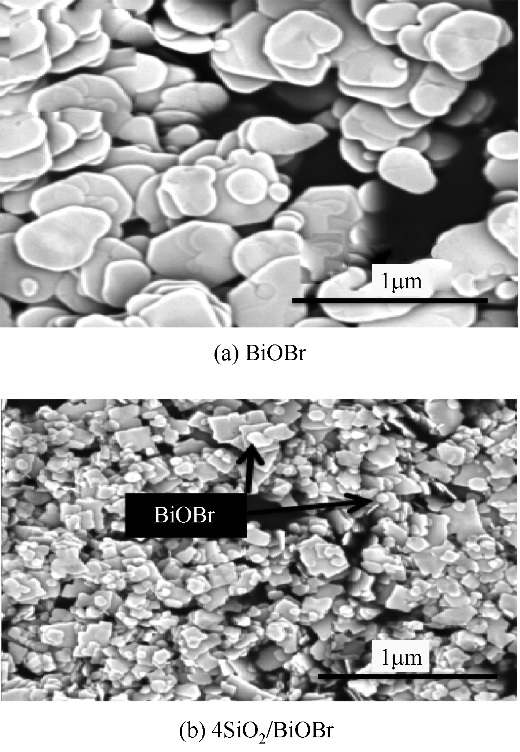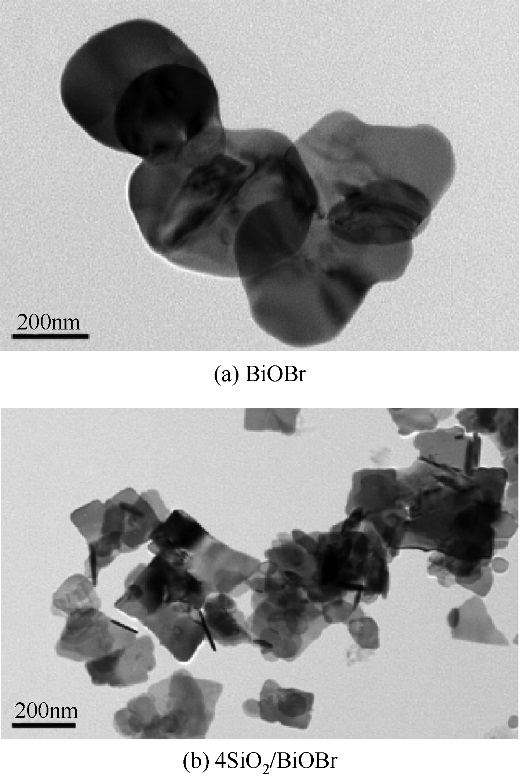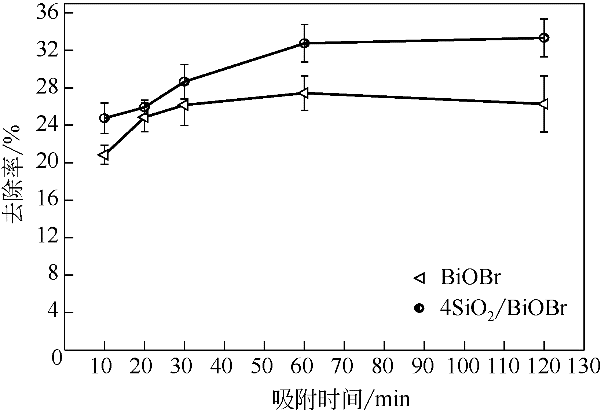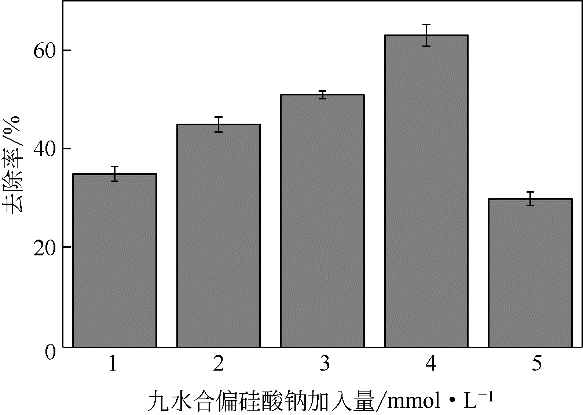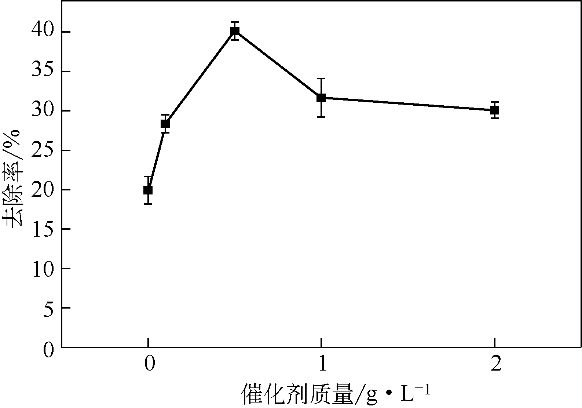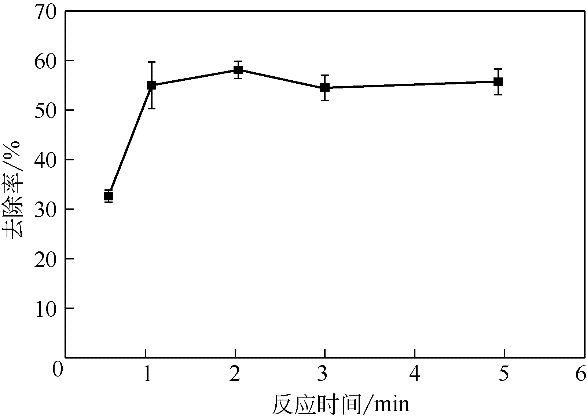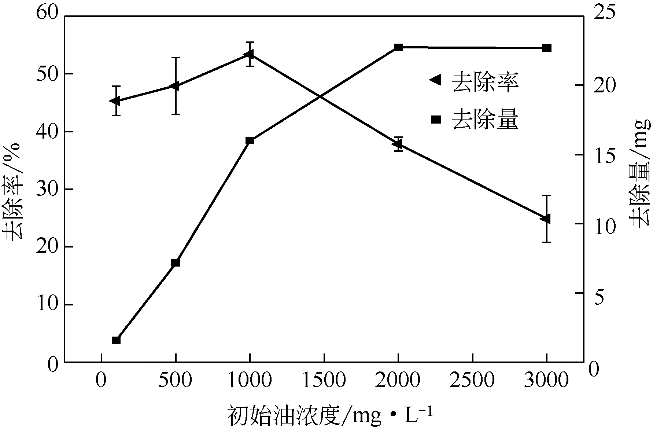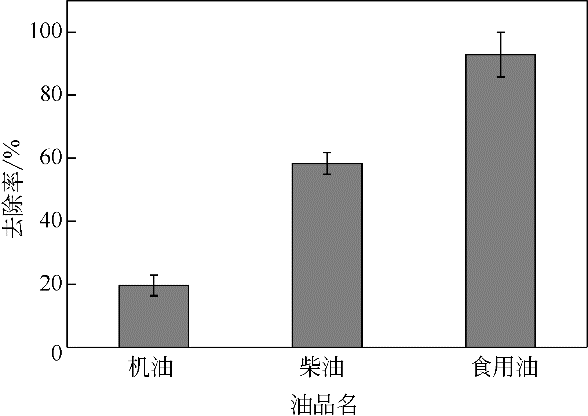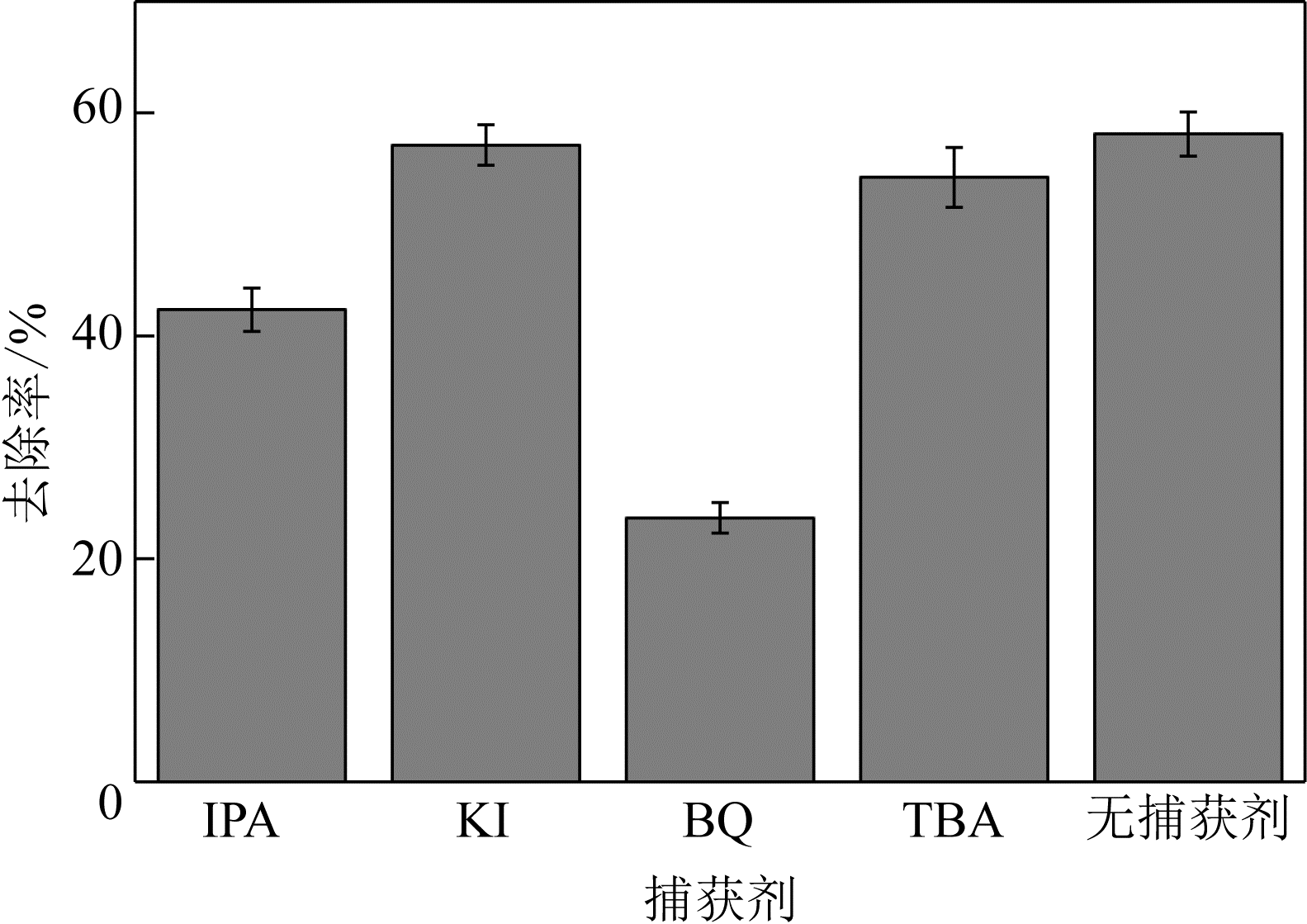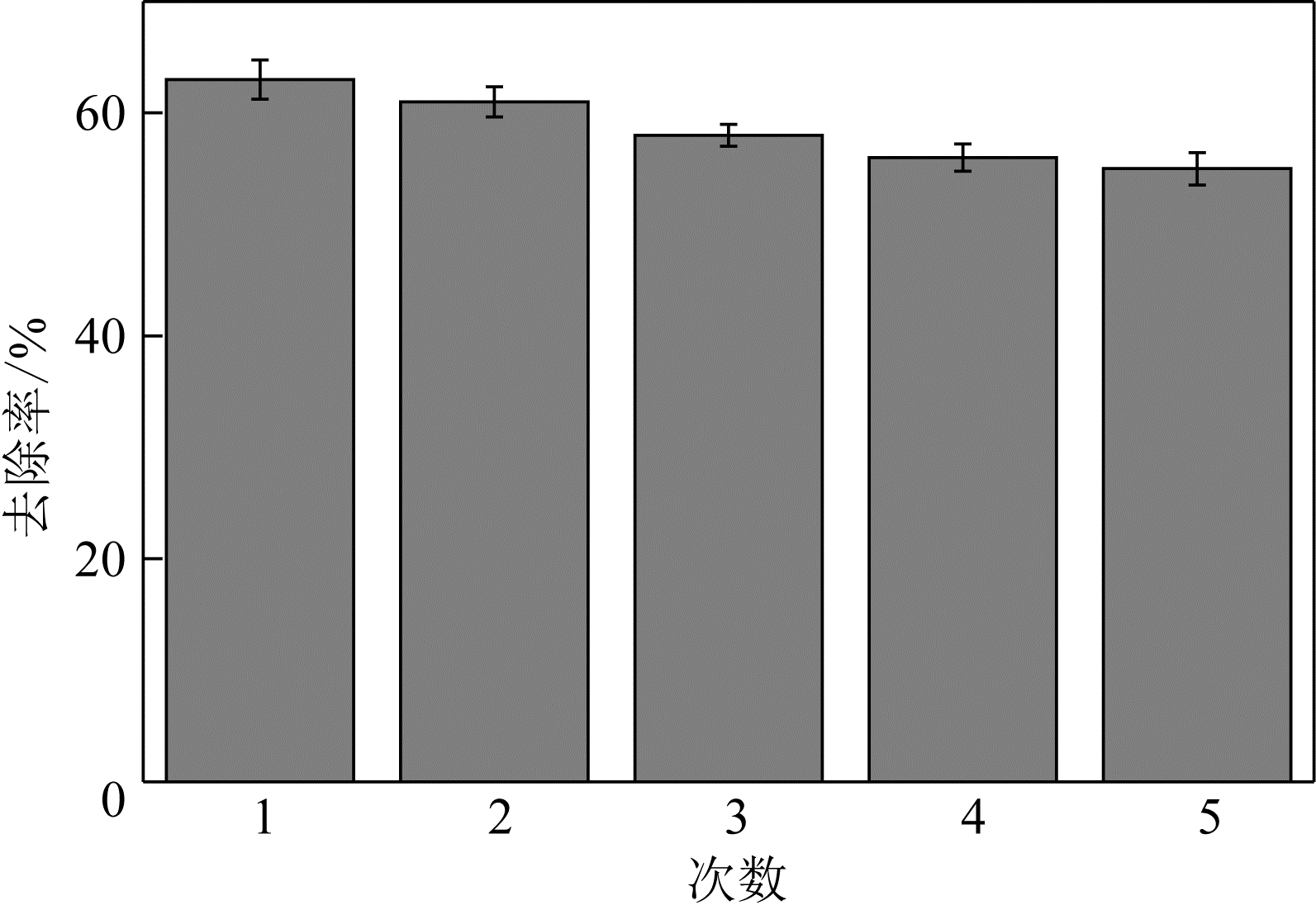化工进展 ›› 2019, Vol. 38 ›› Issue (9): 4085-4094.DOI: 10.16085/j.issn.1000-6613.2018-2317
SiO2/BiOBr光催化材料制备及其对含油废水的处理
- 1. 同济大学环境科学与工程学院,上海 200092
2. 重庆市环境科学研究院环境工程技术研究中心,重庆 401147
-
收稿日期:2018-11-28出版日期:2019-09-05发布日期:2019-09-05 -
通讯作者:郜洪文 -
作者简介:仇宏暄(1995—),男,硕士研究生,研究方向为含油废水的处理。E-mail:sharpqiu@126.com 。 -
基金资助:政府间国际科技创新合作重点项目(2016YFE0123800);重庆市科研机构绩效激励引导专项(cstc2018jxjl2017)
Preparation of SiO2/BiOBr photocatalytic materials and treatment ofoily wastewater
Hongxuan QIU1( ),Yichang YU2,Chengjun LI1,Hongwen GAO1(
),Yichang YU2,Chengjun LI1,Hongwen GAO1( )
)
- 1. College of Environmental Science and Engineering, Tongji University, Shanghai 200092, China
2. Environmental Engineering Technology Research Center, Chongqing Academy of Environmental Sciences, Chongqing 401147,China
-
Received:2018-11-28Online:2019-09-05Published:2019-09-05 -
Contact:Hongwen GAO
摘要:
近几年来,水体中油污污染问题已引起广泛关注。许多研究尝试利用光催化材料催化降解含油废水,但催化条件大多仍局限于紫外光照。为解决这一问题,本研究将SiO2作为催化剂载体,采用共沉淀法制备出能在可见光下使用的SiO2/BiOBr复合材料。该材料经XRD、XPS、DRS、BET等测试分析后发现,BiOBr可负载于SiO2的片层表面,同时可有效增大其比表面积,提高吸附性能。并且将制备条件优化后表明,当n(Bi)∶n(Si)=1∶1时,该材料的比表面积为83.53m2/g,禁带宽度(E g)为2.79eV,复合效果最佳。使用该复合材料对不同类型油进行催化反应后,机油、柴油、食用油的去除率分别可达25%、60%、93%。本文详细分析了该材料柴油的光降解机理,发现·O2 -是最为主要的活性基团。
中图分类号:
引用本文
仇宏暄,余义昌,黎城君,郜洪文. SiO2/BiOBr光催化材料制备及其对含油废水的处理[J]. 化工进展, 2019, 38(9): 4085-4094.
Hongxuan QIU,Yichang YU,Chengjun LI,Hongwen GAO. Preparation of SiO2/BiOBr photocatalytic materials and treatment ofoily wastewater[J]. Chemical Industry and Engineering Progress, 2019, 38(9): 4085-4094.
| 材料 | O 1s/% | Si 2p/% | Br 3d/% | Bi 4f/% |
|---|---|---|---|---|
| BiOBr | 34.06 | 0.00 | 25.63 | 40.31 |
| 4SiO2/BiOBr | 52.28 | 13.41 | 14.02 | 20.29 |
表1 原子质量分数表
| 材料 | O 1s/% | Si 2p/% | Br 3d/% | Bi 4f/% |
|---|---|---|---|---|
| BiOBr | 34.06 | 0.00 | 25.63 | 40.31 |
| 4SiO2/BiOBr | 52.28 | 13.41 | 14.02 | 20.29 |
| 油品名 | 密度/g·mL-1 | 运动黏度(20℃)/mm2·s-1 | 成分 |
|---|---|---|---|
| 机油 | 0.91 | 67.81 | 非挥发性油脂 |
| 食用油 | 0.91 | 12 | C12饱和脂肪酸 |
| 柴油 | 0.83 | 26 | C9~C25烷烃基 |
表2 不同油品性质对比
| 油品名 | 密度/g·mL-1 | 运动黏度(20℃)/mm2·s-1 | 成分 |
|---|---|---|---|
| 机油 | 0.91 | 67.81 | 非挥发性油脂 |
| 食用油 | 0.91 | 12 | C12饱和脂肪酸 |
| 柴油 | 0.83 | 26 | C9~C25烷烃基 |
| 1 | XU C , JIAO C , YAO R , et al . Adsorption and regeneration of expanded graphite modified by CTAB-KBr/H3PO4 for marine oil pollution[J]. Environmental Pollution, 2018, 233: 194-200. |
| 2 | KING S M , LEAF P A , OLSON A C , et al . Photolytic and photocatalytic degradation of surface oil from the deepwater horizon spill[J]. Chemosphere, 2014, 95(1): 415-422. |
| 3 | JUDD S , QIBLAWEY H , Al-MARRIL M , et al . The size and performance of offshore produced water oil-removal technologies for reinjection[J]. Separation & Purification Technology, 2014, 134: 241-246. |
| 4 | 张翼, 于婷, 毕永慧,等 . 含油废水处理方法研究进展[J]. 化工进展, 2008, 27(8): 1155-1161. |
| ZHANG Yi , YU Ting , BI Yonghui , et al . Research progress of oily wastewater treatment methods[J]. Chemical Industry and Engineering Progress, 2008, 27(8): 1155-1161. | |
| 5 | 吴云英, 于晓彩, 金晓杰,等 . 碳纳米管和纳米二氧化钛复合光催化剂处理海洋柴油污染的研究[J]. 海洋技术学报, 2015, 34(5):104-108. |
| WU Yunying , YU Xiaocai , JIN Xiaojie , et al . Study on the treatment of marine diesel pollution by carbon nanotubes and nano-titanium dioxide composite photocatalyst[J]. Journal of Marine Technology, 2015, 34(5): 104-108. | |
| 6 | 欧阳仟, 姚静雯, 黄进, 等 . Pt/Al2O3-beta催化脂肪酸甲酯加氢脱氧制备第二代生物柴油[J].石油化工, 2018, 47(9): 929-935. |
| OUYANG Qian , YAO Jingwen , HUANG Jin , et al . Preparation of second generation biodiesel by hydrodeoxidation of fatty acid methyl ester catalyzed by Pt/Al2O3-beta[J]. Petrochemical Industry, 2008, 47(9): 929-935. | |
| 7 | 史晨, 杨庆, 李娜 . 生物接触氧化法处理机务段含油废水试验研究[J]. 工业水处理, 2012, 32(12): 42-44. |
| 8 | SHI Chen , YANG Qing , LI Na . Experimental study on biological contact oxidation treatment of oily wastewater from locomotive depot[J]. Industrial Water Treatment, 2012, 32(12): 42-44. |
| 9 | 宜慧, 常波, 杨玲引, 等 . 高效石油烃降解菌的筛选及其对原油污染土壤的修复[J]. 化工环保, 2018, 38(4): 461-465. |
| YI Hui , CHANG Bo , YANG Lingyin ,et al . Screening of high efficiency oil hydrocarbon degrading bacteria and its remediation to crude oil contaminated soil[J]. Environmental Protection of Chemical Industry, 2018, 38(4): 461-465. | |
| 10 | TRI P T, VISVANATHAN C , JEGATHEESAN V . Biological treatment of oily wastewater from gas stations by membrane[J]. Revue Du Génie Et De La Science De Lenvironnement, 2006, 5(4): 309-316. |
| 11 | YU X C , JI Q Y , ZHANG J , et al . Photocatalytic degradation of diesel pollutants in seawater under visible light[J]. Regional Studies in Marine Science, 2018, 18: 139-144. |
| 12 | COCA J , GUTIERREZ G , BENITO J . Treatment of oily wastewater[M]// Nato Science for Peace & Security, Springer, 2011: 1-55. |
| 13 | Hamerski MACIEJ , Grzechulska JOANNA , ANTONI Waldemar Morawski . Photocataslytic purification of soil contaminated with oil using modified TiO2 powders[J]. Solar Energy, 1999, 66(6): 395-399. |
| 14 | ZIOLLI R L , JARDIM W F . Photocatalytic decomposition of seawater-soluble crude-oil fractions using high surface area colloid nanoparticles of TiO2 [J]. Photochem Photobiol A, 2002, 147: 205-212. |
| 15 | SIVAKUMAR A , MURUGESAN B , LOGANATHAN A , et al . A review on decolourisation of dyes by photodegradation using various bismuth catalysts[J]. Journal of the Taiwan Institute of Chemical Engineers, 2014, 45(5): 2300-2306. |
| 16 | LV Y , PAN C , MA X, et al . Production of visible activity and UV performance enhancement of ZnO photocatalyst via vacuum deoxidation[J]. Applied Catalysis B: Environmental, 2013, s138/139(28): 26-32. |
| 17 | GUO M Y , NG A M C, LIU F Z , et al . Effect of native defects on photocatalytic properties of ZnO[J]. J. Phys. Chem. C, 2011, 115(22): 11095-11101. |
| 18 | 季秋忆, 于晓彩, 张健, 等 .可见光下利用ZrO2(Er3+)/TiO2光催化降解海水中柴油污染[J]. 材料导报, 2017, 31(s1): 368-373. |
| JI Qiuyi , YU Xiaocai , ZHANG Jian , et al . Photocatalytic degradation of diesel pollution in seawater by ZrO2(Er3+)/TiO2 in visible light[J]. Materials Review, 2017, 31(s1): 368-373. | |
| 19 | XU C W , XIE W X , YU Y , et al . Photocatalytic and filtration performance study of TiO2/CNTs-Filter for oil particle[J]. Process Safety and Environmental Protection, 2019, 123: 72-78. |
| 20 | ASHWIN C , CHIN K C . Photocatalytic treatment of palm oil mill effluent by visible light-active calcium ferrite: effects of catalyst preparation technique[J]. Journal of Environmental Management, 2019, 234: 404-411. |
| 21 | LI H , LI N , CHEN D , et al . Polyethylene imine-grafted ACF@BiOI0.5Cl0.5, as a recyclable photocatalyst for high-efficient dye removal by adsorption-combined degradation[J]. Applied Surface Science, 2017, 403: 80-88. |
| 22 | TIAN Y , LI W , ZHAO C H , et al . Fabrication of hollow mesoporous SiO2-BiOCl@PANI@Pd photocatalysts to improve the photocatalytic performance under visible light[J]. Applied Catalysis B: Environmental, 2017, 213: 136-146. |
| 23 | YUAN L W , LI L L , WANG L J , et al . Accelerated photocatalytic oxidation of carbamazepine by a novel 3D hierarchical protonated g-C3N4/BiOBr heterojunction: performance and mechanism[J]. Applied Surface Science, 2019, 437: 527-539. |
| 24 | HUANG Q , LIN Y , CAI T , et al . Simultaneous removal of heavy metal ions and organic pollutant by BiOBr/Ti3C2 nanocomposite[J]. Journal of Photochemistry and Photobiology A: Chemistry, 2019, 375: 201-208. |
| 25 | PHATTRANIT D , ANUKORN P , KHWANCHANOK D , et al . Microwave-hydrothermal synthesis of BiOBr/Bi2WO6 nanocomposites for enhanced photocatalytic performance[J]. Ceramics International, 2018, 44(s1): s148-s151. |
| 26 | LI W , JIA X , LI P , et al . Hollow mesoporous SiO2-BiOBr nanophotocatalyst: synthesis, characterization and application in photodegradation of organic dyes under visible-light irradiation[J]. Electric Power Information & Communication Technology, 2015, 3(6):150427002715002. |
| 27 | ZHU S R , QI Q , ZHAO W N , et al . Hierarchical core-shell SiO2@PDA@BiOBr microspheres with enhanced visible-light-driven photocatalytic performance[J]. Dalton Trans., 2017, 46(34): 11451-11458. |
| 28 | DI J , XIA J , JI M , et al . Carbon quantum dots induced ultrasmall BiOI nanosheets with assembled hollow structures for broad spectrum photocatalytic activity and mechanism insight[J]. Langmuir the Acs Journal of Surfaces & Colloids, 2016, 32(8): 2075. |
| 29 | CHENG L , YAN J , ZHAO S , et al .Multiple charge carrier transfer pathways in BiOBr/Bi2O3/BiO0.67F1.66 ternary composite with high adsorption and photocatalytic performance[J]. Journal of Alloys and Compounds, 778, 2019: 924-832. |
| 30 | WANG D , HOU P , YANG P , et al . BiOBr@SiO2, flower-like nanospheres chemically-bonded on cement-based materials for photocatalysis[J]. Applied Surface Science, 2017, 430: 539-548. |
| 31 | JAFARI H , AFSHAR S , ZABIHI O , et al . Enhanced photocatalytic activities of TiO2-SiO2, nanohybrids immobilized on cement-based materials for dye degradation[J]. Research on Chemical Intermediates, 2016, 42(4):2963-2978. |
| 32 | MACHIDA M , NORIMOTO K , WATANABE T , et al . The effect of SiO2 addition in super-hydrophilic property of TiO2 photocatalyst[J]. Journal of Materials Science, 1999, 34(11): 2569-2574. |
| 33 | 张雨春 .纳米二氧化钛光催化氧化法降解含蜡油/柴油循环水[D]. 北京: 北京化工大学, 2008. |
| ZHANG Yuchun . Photocatalytic oxidation of nanometer titanium dioxide to degrade waxy oil/diesel oil circulating water[D]. Beijing: Beijing University of Chemical Technology, 2008. | |
| 34 | 崔玲君, 张前前, 李苓, 等 . 海水中原油光降解与TiO2光催化降解的比较研究[J]. 中国海洋大学学报(自然科学版), 2016, 46(6):100-107. |
| CUI Lingjun , ZHANG Qianqian , LI Lin , et al . Comparison between photodegradation of crude oil and photocatalytic degradation of TiO2 in seawater[J]. Journal of Ocean University of China (Natural Science Edition), 2016, 46(6): 100-107. | |
| 35 | JI Q , YU X , ZHANG J , et al . Photocatalytic degradation of diesel pollutants in seawater by using ZrO2 (Er3+)/TiO2, under visible light[J]. Journal of Environmental Chemical Engineering, 2017, 5(2):1423-1428. |
| 36 | 姜建辉, 梁鹏举, 刘速,等 . Cu、Ni共掺杂ZnO光催化性能及机理[J]. 无机化学学报, 2018, 34(3): 499-506. |
| JIANG Jianhui , LIANG Pengju , LIU Su , et al . Photocatalytic performance and mechanism of Cu and Ni co-doped ZnO[J]. Journal of Inorganic Chemistry, 2018,34(3):499-506. | |
| 37 | 康宏平, 孙振亚, 刘建永,等 . Ag+-TiO2/AC复合材料的可见光吸附-光催化协同作用[J].环境工程学报, 2015, 9(4): 1620-1624. |
| KANG Hongping , SUN Zhenya , LIU Jianyong , et al . Visible light adsorption-photocatalytic synergies of Ag+-TiO2/AC composites[J]. Journal of Environmental Engineering, 2015, 9(4): 1620-1624. | |
| 38 | JI Q , YU X , NIE Z , et al . Lanthanide oxide doped zinc oxide: effective photocatalysts for the degradation of diesel in seawater under visible light irradiation[J]. Reaction Kinetics Mechanisms & Catalysis, 2018, 124(1): 1-12. |
| 39 | WANG G , SUN Q , ZHANG Y , et al . Sorption and regeneration of magnetic exfoliated graphite as a new sorbent for oil pollution[J]. Desalination, 2010, 263(1): 183-188. |
| 40 | FU J , TIAN Y , CHANG B , et al . BiOBr-carbon nitride heterojunctions: synthesis, enhanced activity and photocatalytic mechanism[J]. Journal of Materials Chemistry, 2012, 22(39): 21159-21166. |
| 41 | ZHANG J , WANG X , WANG X , et al . Floating photocatalysts based on loading Bi/N-doped TiO2 on expanded graphite C/C (EGC) composites for the visible light degradation of diesel[J]. RSC Advances, 2015, 5(88): 71922-71931. |
| 42 | YU Y , LI C , HUANG S , et al . BiOBr hybrids for organic pollutant removal by the combined treatments of adsorption and photocatalysis[J]. RSC Adv., 2018, 8: 32368. |
| 43 | ZHOU Y , LI W , WAN W , et al . W/Mo co-doped BiVO4, for photocatalytic treatment of polymer-containing wastewater in oilfield[J]. Superlattices & Microstructures, 2015, 82: 67-74. |
| [1] | 张明焱, 刘燕, 张雪婷, 刘亚科, 李从举, 张秀玲. 非贵金属双功能催化剂在锌空气电池研究进展[J]. 化工进展, 2023, 42(S1): 276-286. |
| [2] | 时永兴, 林刚, 孙晓航, 蒋韦庚, 乔大伟, 颜彬航. 二氧化碳加氢制甲醇过程中铜基催化剂活性位点研究进展[J]. 化工进展, 2023, 42(S1): 287-298. |
| [3] | 谢璐垚, 陈崧哲, 王来军, 张平. 用于SO2去极化电解制氢的铂基催化剂[J]. 化工进展, 2023, 42(S1): 299-309. |
| [4] | 杨霞珍, 彭伊凡, 刘化章, 霍超. 熔铁催化剂活性相的调控及其费托反应性能[J]. 化工进展, 2023, 42(S1): 310-318. |
| [5] | 胡喜, 王明珊, 李恩智, 黄思鸣, 陈俊臣, 郭秉淑, 于博, 马志远, 李星. 二硫化钨复合材料制备与储钠性能研究进展[J]. 化工进展, 2023, 42(S1): 344-355. |
| [6] | 王乐乐, 杨万荣, 姚燕, 刘涛, 何川, 刘逍, 苏胜, 孔凡海, 朱仓海, 向军. SCR脱硝催化剂掺废特性及性能影响[J]. 化工进展, 2023, 42(S1): 489-497. |
| [7] | 邓丽萍, 时好雨, 刘霄龙, 陈瑶姬, 严晶颖. 非贵金属改性钒钛基催化剂NH3-SCR脱硝协同控制VOCs[J]. 化工进展, 2023, 42(S1): 542-548. |
| [8] | 程涛, 崔瑞利, 宋俊男, 张天琪, 张耘赫, 梁世杰, 朴实. 渣油加氢装置杂质沉积规律与压降升高机理分析[J]. 化工进展, 2023, 42(9): 4616-4627. |
| [9] | 王鹏, 史会兵, 赵德明, 冯保林, 陈倩, 杨妲. 过渡金属催化氯代物的羰基化反应研究进展[J]. 化工进展, 2023, 42(9): 4649-4666. |
| [10] | 张启, 赵红, 荣峻峰. 质子交换膜燃料电池中氧还原反应抗毒性电催化剂研究进展[J]. 化工进展, 2023, 42(9): 4677-4691. |
| [11] | 王伟涛, 鲍婷玉, 姜旭禄, 何珍红, 王宽, 杨阳, 刘昭铁. 醛酮树脂基非金属催化剂催化氧气氧化苯制备苯酚[J]. 化工进展, 2023, 42(9): 4706-4715. |
| [12] | 葛亚粉, 孙宇, 肖鹏, 刘琦, 刘波, 孙成蓥, 巩雁军. 分子筛去除VOCs的研究进展[J]. 化工进展, 2023, 42(9): 4716-4730. |
| [13] | 林晓鹏, 肖友华, 管奕琛, 鲁晓东, 宗文杰, 傅深渊. 离子聚合物-金属复合材料(IPMC)柔性电极的研究进展[J]. 化工进展, 2023, 42(9): 4770-4782. |
| [14] | 王尚彬, 欧红香, 薛洪来, 曹海珍, 王钧奇, 毕海普. 黄原胶和纳米二氧化硅对无氟泡沫性能的影响[J]. 化工进展, 2023, 42(9): 4856-4862. |
| [15] | 邵志国, 任雯, 许世佩, 聂凡, 许毓, 刘龙杰, 谢水祥, 李兴春, 王庆吉, 谢加才. 终温对油基钻屑热解产物分布和特性影响[J]. 化工进展, 2023, 42(9): 4929-4938. |
| 阅读次数 | ||||||
|
全文 |
|
|||||
|
摘要 |
|
|||||



